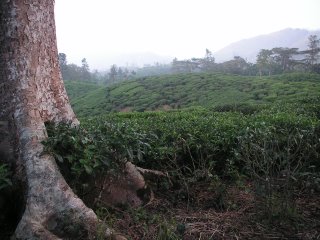




While driving through the highland tea plantations, we met a few tea pickers, who gave us directions, allowed us to take a photo of them and showed us where was a nearby pila (aqueduct-like system to bring water down to workers’ bathing area). Some people in the group wanted a quick bath in the spring water to cleanse the day’s 13 layers of sweat.
Ms. (Thangaraju – family name) Kamalam, about early 40s with one 7-8 year old son and one teenage daughter working as nanny in Colombo, led the group through the tea pickers’ neat maze of black tea, and their cricket fields to a refreshing bathing spot. She and her fellow women pickers told us that they get up at 4am to cook breakfast on their wood-burning stoves for families, then get in line to be selected for work by 7am. After 7am they may miss the opportunity to get the daily pay (135 rupees/$1.35/day). Most tea pickers, strap a basket-in-satchel to their foreheads, where it hangs in the back so they can deposit their tea leaves. They carry long sticks to ward off snakes and before the day begins they pray to Hindu shrines at the foot of tea plantation to ask that they are not attacked by snakes. The pickers work until 4-5pm in order to be home in time to prepare meals and settle in children. It is unknown what happens with many of the husbands and fathers of these women, but there is a strong presence of women in the fields. The men I did see were playing cricket at the end of the day, bathing or chatting with friends. A massive contrast to the women’s schedules; despite all their work, the women still had time to show around inquisitive foreigners.
Most tea pickers will work on plantations their whole lives, passing on the work to future generations. The majority of pickers are Indian Tamils, brought in by colonialists as cheap labour. They continue to face harassment, racism and marginalization by Sri Lankan Tamils, residing in North and East of the country. It is interesting to note that most tea pickers voted for Ranil, the UNP opposition party leader, as he has been an integral part of the peace process. Tea pickers risked a day off work to vote for a peaceful leader, but their efforts were futile because Mahinda got in instead.
Ms. Kamalam’s mouth was bright red from chewing betel leaves, had streaks of silver in her black hair and exuded graciousness, modesty and politeness. I got her address in case I can write to her (estate employers would most likely translate) or send her some extra income, even $5 USD/500 rupees a month could make a huge difference. On the other side of the coin, why couldn’t tea prices be raised slightly higher, in order to provide a more substantial living to tea plantation workers? What is the role of fair trade tea in Sri Lanka? What efforts are made to offer higher skill training to future generations?
As follows:
Ms. Thangaraju Kamalam
Brunswick Tea Estate
Maskeliya, Sri Lanka
No comments:
Post a Comment